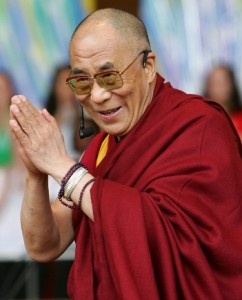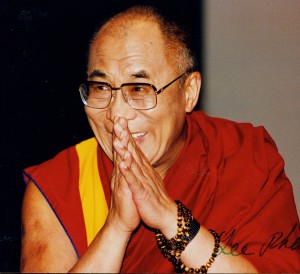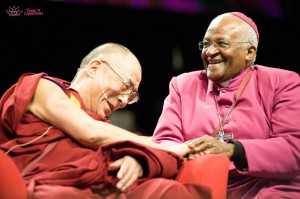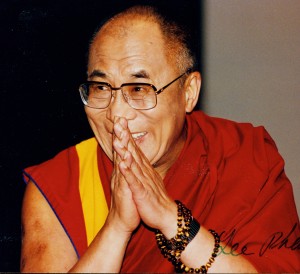
An excerpt from a teaching called Compassion, Love, & Wisdom by Jetsunma Ahkon Lhamo
We need to practice human kindness. For instance if someone described to me child abuse and they said to me, “As a Buddhist you believe in karma, do you just accept that this is the child’s karma to have experienced abuse and do you sort of leave it at that and think, well that is their karma and pray for them?” Well, Lord Buddha, I don’t know what you would say if you were here right now, standing here in the flesh, but I’ll tell you what I understand to be the Buddha’s perspective. If you see someone being abused or hurt and you do nothing to end their suffering that is now your karma. You will have karma with them and you always will until you can be of benefit to them. So ordinary human kindness is very much a part of what we have to do, but it isn’t all that we do.
We have to prevent people from being hurt; we have to feed the hungry if we can. If we see suffering we have to do what we can to end it. But it is simply not useful to stop there. We must continue with an extraordinary kind of love, an extraordinary kind of compassion that sees beyond the causes and effects that are only obvious in this life time and goes further to understand the root cause and the ultimate effect. We must develop the capacity to completely liberate ourselves from the cause and effect relationships that have been caused from the beginningless past and that are with us always until we reach enlightenment. We have to think not only of this one slice of reality that is our life, what is it – eighty years? We have to think of the countless eons of cyclic existence that we have continued to accumulate cause and effect relationships and we must institute causes that overcome all of them. You have to get some perspective. To practice Dharma sincerely you have to get some perspective. It isn’t just about eighty years. It is about a long time. You may not always understand the causes that you experience the results of now.
It is popular now for people to go to psychics and say, “How come my husband always beats me?” And the psychic says, “Oh, because in a past life you ran over him with a mule.” Well, fine so far as that goes, that may very well be one of the things that happened. Maybe you were the mule and this psychic doesn’t like that, but anyway, that, I promise you, is only one of many things that contribute to your life such as it is now. It is only one of many things and it is impossible for a psychic without complete omniscience to see all of them. You may never know what the root causes are. But what is wonderful about the Buddha’s path is that you don’t have to know what the root causes are: they are all desire, hatred, greed and ignorance. This is the medicine.
Here in the West we love to examine our garbage before we take it out, but you don’t have to do that, you just take it out. This is the necessary perspective to maintain: that the wisdom we must seek is the wisdom that is different from ordinary knowledge, it is the pristine balance of the primordial wisdom state. It is completely in union with love. And that union is the very display, or results in the very display, of what we see bringing the most benefit in this world. When we look in this world and see where there is hope and where there is relief, we find that there is an extraordinary path, that there is an extraordinary means to achieve realization. That there have been, and there are, in this world extraordinary teachers incarnating again and again, and there are extraordinary blessings. We are living in an extraordinary time, able to grasp an extraordinary opportunity. This being the case we should adopt this wisdom as our most precious goal and adopt this love as our most precious mother.
Leaving you with that thought, I hope in some way you will come to the point where you will choose with certainty and with courage and with determination to practice in a consistent and meaningful way. I hope with all my heart you do not waste this precious opportunity. It is taught this opportunity to hear the Buddha’s words and see the Buddha’s form and come to a point where we can accomplish the Buddha’s teaching is so rare it is like finding a precious jewel sifting through garbage. It is that rare. And having had this opportunity once, if we do not institute the causes by which we will have it again and again and again it will be a long time before we see it again. Those are the teachings. I didn’t make that up and I believe them. So I ask you to consider practice, to learn how to practice, to practice consistently and to be faithful in your practice and, most of all, to begin now, even on your own, to turn your mind with thoughts of caring for others. To cultivate both ordinary and extraordinary kindness, to cultivate a pure determination to bring about the end of suffering, these things you can begin now. Thank you.
© Jetsunma Ahkön Lhamo




